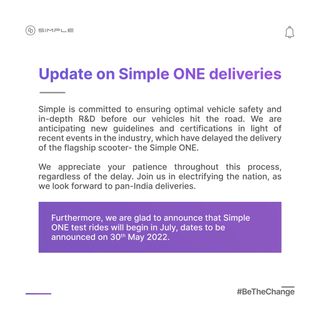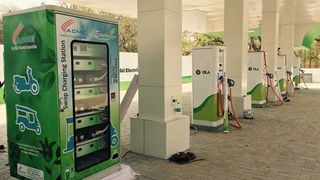Simple Energy puts off e-scooter delivery: Expects new govt guidelines on battery
Echo of recent EV fires

The recent spate of fire incidents involving e-scooters of Ola Electric, Pure Electric, Okinawa, Jitendra Electric and Boom Motors is having a major impact as the government seems to be mulling a new policy for battery packs and testing standards in EVs.
Following the reports of EVs going up in flames or exploding due to alleged faulty battery cells in several parts of the country, the Road Transport Ministry had asked DRDO's (Defence Research Development Organisation's) lab CFEES (Centre for Fire, Explosive and Environment Safety) to conduct an investigation into the unseemly blazes.
And CFEES has submitted its report to the relevant Ministry reportedly finding serious defects in the batteries, including designs of the battery packs and modules.
Now we hear that the government is likely to announce new norms on battery packs and testing standards in EVs. That a new policy is on the anvil emerged from the announcement of Simple Energy deferring the delivery of its Simple One e-scooters.
Simple Energy says it is focused on its vehicle's safety

The Bengaluru-based company, which launched the e-scooter last August, has taken a conscious call to postpone the vehicle deliveries to the first week of September from June. In a tweet the company said, "In light of recent events in the EV industry, we expect updated guidelines for EVs concerning battery health and overall vehicle safety. In accordance with this, we are postponing the deliveries of Simple ONE. Test rides for ONE will begin in July 2022."
"Considering the recent fire incidents in some of the EVs and the government acting on it, we have taken a conscious call of scheduling deliveries of Simple One to September first week," the founder-CEO of the company Suhas Rajkumar was quoted as saying in a PTI report.
He said the company assumes that some policy changes might come in and for this reason it wanted to delay the production as well as deliveries.
Get daily insight, inspiration and deals in your inbox
Sign up for breaking news, reviews, opinion, top tech deals, and more.
"We are primarily focusing on safety and other aspects and if any change that the government wants the EV makers to do, we will carry out that from day one for customers. Also since we have received huge bookings and are looking to start deliveries pan-India rather than going city-wise as per earlier plan, we also want the supply chain to be very strong,” Rajkumar said.
The company had in January said it had amassed 30,000 pre-bookings for its maiden offering and the deliveries will begin from June. Simple Energy had also announced an additional battery pack option for its flagship electric scooter.
Furthermore, Simple Energy has signed an MoU with US-based battery maker C4V for setting up a lithium-ion cell manufacturing facility for cells in India. The partnership, which aims to bring down the dependence on imports, also aims at creating a battery cell manufacturing ecosystem in India and add value to the Make In India cause.
Niti Aayog's draft battery policy

The government's policy think-tank Niti Aayog has already put out draft Battery Swapping Policy. It has asked all the stakeholders to submit their comments before June 5, 2022. The draft policy also has something for the safety of EV batteries.
The draft policy suggests the adoption of a rigorous testing protocol to ensure a high level of protection and also to avoid any unwanted temperature rise at the electrical interface. The battery management system, which is a software that controls battery functions, will have to be self-certified and open for testing to check its compatibility with various systems, and capability to meet safety requirements.
The policy also proposes to assign a unique identification number (UIN) to swappable batteries at the manufacturing stage to help track and monitor them. Further, a UIN number will be assigned to each battery swapping station. It also proposes to install battery swapping stations at several locations like retail fuel outlets, public parking areas, malls, kirana shops and general stores etc.
It is now believed that the new guidelines for battery packs and testing standards in EVs may be incorporated within the Niti Aayog's policy as and when it is formulated and released for implementation by the industry.

Over three decades as a journalist covering current affairs, politics, sports and now technology. Former Editor of News Today, writer of humour columns across publications and a hardcore cricket and cinema enthusiast. He writes about technology trends and suggest movies and shows to watch on OTT platforms.
Most Popular


